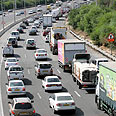
Traffic jam near Poleg intersection
Photo: Ido Erez
Upon the publication of this op-ed, a week after fuel taxes were raised and on the eve of yet another price hike, I am about to become the nation’s most hated figure, so I will start by offering full disclosure: Firstly, I do own a car, and I used it on occasion and enjoy it. Secondly, on occasion I also make use of public transportation, and I am aware that Israel’s train and bus system is terrible.
Yet despite the above, I am convinced that expensive fuel is good, period. Very expensive fuel is very good, and even more expensive fuel is excellent. The reason for this is as follows: Making fuel more expensive will prompt some of us to use our cars a little less, and cars (including mine) are, simply put, humanity’s enemy.
Cars are an enemy because they kill people: Since World War II, road accidents are the leading cause of unnatural death in the world. Cars are also responsible for a significant portion of our air pollution – and this will be the case with electric cars as well, because electricity is produced by burning fuel. Cars turn the world into a loud, stinky, and filthy place, filled with junk metal.
Expensive fuel is good because oil became more expensive, and the refineries should not be subsidizing this price hike and encouraging us to drive. The answer to the rising price of oil should be a decline in demand – because oil is the oxygen of our worst enemies.
Indeed, in Israel fuel is first and foremost a tax. Most of the money we pay for fuel ends up in the State coffers through an excise tax. Yet as opposed to Value Added Tax and similarly to income tax, this tax is imposed on the rich and middle-class, rather than on the weak strata of society. Moreover, as opposed to income tax, this is a tax which the payer can regulate as he or she wishes; a tax that is only imposed on those who feel like traveling in their car.
Pay for it
A car is not a fundamental need, but rather, an indulgence for those who want it. The ultra-Orthodox, foreign workers, students, soldiers, the elderly, and people whose car happens to be in the garage, or whose license was suspended, somehow make do without a car. You want to take your girlfriend to a club? Pay for it. You want to take your kids on a picnic? Pay for it. You don’t feel like carrying the groceries? Pay for it. Your employer wants you to travel to drive to a meeting? He should pay for it. There is no such thing as “I can’t live without a car”; rather, it’s a case of “I don’t want to.”By the way, there is no certainty that a car truly improves the quality of life of all motorists. Cycling and walking are enjoyable and healthier than driving, and one can cross any city in Israel, with the exception of Jerusalem and Haifa, by bicycle or even by foot. Those who have no time for it, because they need to work all the time, can work on the train instead of driving through traffic jams.
Indeed, public transportation around here is crappy, yet the congestion on our roads turns them into a nightmare as well. The quickest way to travel from the center of one major city to another – be it Jerusalem or Tel Aviv, Haifa or Beersheba – is through public transportation, and those who insist on traveling by car, because it’s a habit, an indulgence, or good for their ego (“what, you want me to take the bus?!”) should suffer – and pay.
More expensive fuel will not create absolute justice. The truly rich will continue to drive, while those who barely make ends meet will have to give up their car. Yet life is not a communist utopia, and the pleasures of life will never be divided fairly. Residents of peripheral towns will be inconvenienced to a greater extent. Yet there too, the truly poor residents somehow make do without owning a car.
Some will claim that there are other ways to save money. Indeed, that’s true. The government doesn’t have to comprise 700 ministers, we can forego the planned income tax reduction, and we can make the Electric Company and possibly the IDF more efficient. All of this is true, but it doesn’t contradict what I wrote: The State needs money, and it needs to reduce the use of cars, and it would do well to combine these two aims. You want to drive your car anyway? Pay for it.















